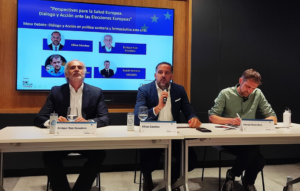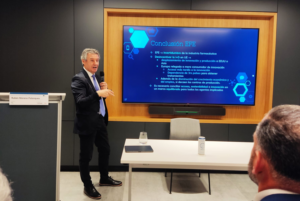


Gema Maldonado
Directives, regulations, strategies and large funds to build the European Health Union will mark the next term of the Government of 27. Most of them are underway after the boost provided by the Covid-19 pandemic, but how will they develop? and final approval will depend largely on the European Parliament that is elected in next Sunday’s elections and the new European Commission. Therefore, what can we expect in health matters from the European Union?
“It will depend on the policies and actions of the next European Commission. The legislation does not decline, it will continue, but it will depend on what the new commissioners want or do not want to promote, and on the modifications that the Council may introduce.”, warned this Monday Rubén Moreno, a scientist and politician who has held various positions in the health field, including the Secretary of State for Health, in addition to having been a deputy and senator. Moreno participated as a speaker at the conference Perspectives for European health. Dialogue and Action before the European Electionsorganized by BioInnova Consulting together with the companies Chiesi and Lilly Spain.


Rubén Moreno: “It will depend on the policies and actions of the next European Commission. The legislation does not decline, it will continue, but it will depend on what the new commissioners want or do not want to promote.”
The EU4Health 2021-2027 Program is one of the initiatives towards the European Health Union that came as a result of the pandemic, with a funding allocation of 5.3 billion euros. The European Plan to Fight Cancer, which is considered one of the pillars of the European Health Union, was already being developed before the pandemic to end up being published in 2021. Another 4,000 million are already allocated to this ambitious project.

The so-called European Health Data Space, which is under construction, promises the secure exchange of data to improve healthcare through its use for research purposes. At the end of 2022 and the Commission adopted the EU Global Health Strategy with health goals to be achieved until 2030.
Along with these initiatives, there are other legislative ones that have been brewing for months, and that will move forward with the new Parliament and the Commission that ends up being formed. This is the reform package of pharmaceutical legislation, “where we have had the most debate at the European level” Moreno pointed out, which also includes the regulation on compulsory licenses for crisis management, which already passed the first reading process in Parliament last March, and the regulation for the evaluation of health technologies, which will be applied from January 2025, and which will have important repercussions in the states, especially in Spain.
The new pharmaceutical legislation is the one that has generated the most debate within the European institutions
The new pharmaceutical legislation proposes to reduce the time of protection of regulatory data, that is, the time of the patent of the drug in the European market to 7.5 years (at first the proposal was six years), which may be extended if the drug is intended for an unmet medical need or if it has comparative clinical trials, among other issues.
At the same time, a new article has been introduced in innovation incentives, article 58a, by which pharmaceutical companies have the obligation to submit a request for pricing and reimbursement in all member states within the first year of receiving marketing authorization, so that the Union ensures that the medicine can be accessible in all countries and not only in those where it may be more profitable for the pharmaceutical company. But this article also implies obligations for member states: they have to set the price-reimbursement within a time established of a maximum of six months.
If member states do not set the price-reimbursement of drugs in 180 ideas, laboratories may choose not to market their medicine in the country in question.
“If a state does not comply with the 180-day period established by Directive 89/105/EEC (which is not complied with in many states despite the fact that it is mandatory), with the new legislation the laboratory will not have the obligation to be in that state. , except in the case of orphan drugs and advanced therapies, in which there will be a different deadline”Moreno explained.

In Spain the 180 days are multiplied by three. On average, you have to wait an average of 629 days to access a drug that has been authorized by the EMA, compared to the 128 days recorded in Germany. Another 150 days on average are added to this period “due to the re-evaluation of the autonomous communities and innovative public procurement,” said the former Secretary of State for Health.
On the other hand, the Health Technology Assessment Regulation will be applied in the member states from January 2025. The Ministry of Health has made it a priority to have the Royal Decree ready in Spain throughout this year, but the text “the autonomous communities are not yet aware of it”Moreno pointed out.
Enrique Ruiz Escudero: “The legislative environment is an important challenge, because it has an impact on the management models that must accompany managers”
Regarding this aspect, the spokesperson for the Senate Health Commission and former Health Minister in Madrid, Enrique Ruiz Escudero, has highlighted that from the autonomous communities “There is a feeling of distance from the decisions made at the European level”an aspect “which is important to work on”Besides that ““The legislative environment is an important challenge, because it has an impact on the management models that must accompany managers.”.
Together with Ruiz Escudero, Kilian Sánchez San Juan, spokesperson for the Health Commission of the Socialist Parliamentary Group in the Senate, and Florent Marcellesi, Sumar candidate for the elections, have given their vision on the challenges in the next legislature regarding health in Europe. European.
Kilian Sánchez: “We have to ensure that the European Data Space does not allow the secondary use of data for commercial purposes or the evaluation of insurance applications”
The three political representatives have agreed on the need for new pharmaceutical legislation, but also on the development of a European data space, on which Sánchez San Juan has pointed out the need to “ensure that it is done by anonymizing the data, in an appropriate manner and that it does not allow its secondary use for commercial purposes or for evaluating insurance applications”. Furthermore, he has made reference to social determinants and has been in favor of analyzing not only the clinical data of the patients, but also “social data to comprehensively address people’s health.”
Carrying out a European strategy for cardiovascular health and another for rare diseases are objectives that are also on the political agendas of the parties that participated in the event. In the case of rare diseases, Sumar’s candidate has stated that “The first thing is to coordinate at the European level, something that Spain has already begun to do during the presidency of the Council of the EU and that the Belgian presidency has continued”.
Florent Marcellesi: “Many illnesses and deaths are due to heat waves and droughts, especially in a country like ours. Depending on the vote we have in the elections, we will have or not the European Green Deal.”
Secondly, he has demanded that the public sector lead the advance in rare diseases, since “The industry has made efforts, and it is improving, but it does not always look at the public interest, and that is normal, it is a company, that is why public leadership is so important”. Marcellesi has also warned of the risk of the extreme right gaining a greater presence in the European Parliament, among other reasons, due to its intention to end the European Green Deal. “Many illnesses and deaths are due to heat waves and droughts, especially in a country like ours. Depending on the vote we have in the elections, we will have or not the European green pact, and we will fight so that health is included in all policies.”it is finished.

